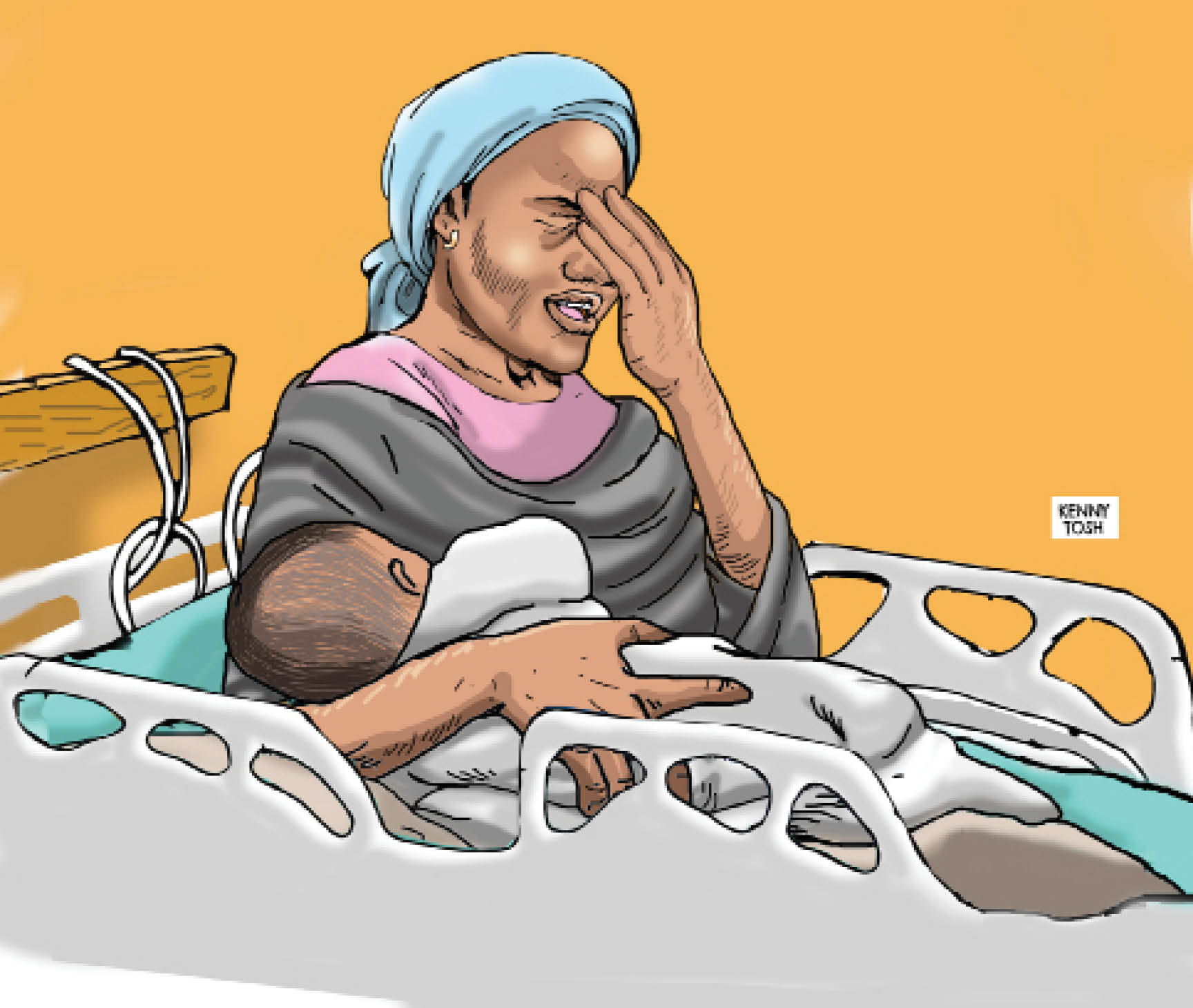After the rigours of childbirth, society tends to shift focus to the radiance of motherhood. But behind closed doors, a silent crisis lurks, which leaves the woman to deal with a dim side of child birth that only she can understand. In this report, Weekend Trust looks at postpartum experiences of mothers as well as ways such conditions can be well managed.
What is postpartum depression?
The World Health Organization (WHO) in its 2024 report on maternal mental health recognises postpartum depression (PPD) as a significant public health concern.
WHO estimates that globally, around 10 per cent of pregnant women and 13 per cent of women who just gave birth experience mental health disorders, with depression being the most common.
The report highlights that these rates are even higher in developing countries, reaching 15.6 per cent during pregnancy and 19.8 per cent after childbirth. This can have serious consequences, not just for the mother’s well-being, but also for the child’s development.
Postpartum depression, according to a UNICEF online publication, is a mood disorder that occurs in mothers after giving birth.
In an interview with Weekend Trust, Dr. Chibuzo Samuelson, Senior Registrar Department of Obstetrics and Gynaecology at the Jos University Teaching Hospital JUTH, Plateau State, explained postpartum depression to mean a persistent debilitating psychological disorder that occurs after childbirth that is severe to an extent a woman finds it difficult to cater for herself or her baby.
He said the condition comes with the feeling of sadness, worthlessness, low mood and loss of interest, which usually occurs immediately after childbirth and lasts for, sometimes, up to one year.
Experiencing postpartum depression
Mrs Momo Ikwegbu, a mother of two in her late thirties, who shared her experience with Weekend Trust, narrated how difficult it was for her to cope with the pressures that came with being a new mum. The resident of Karu in Abuja, said that prior to her experiences, she had envisioned that the arrival of her baby would be the greatest joy of her life and nothing more.
She added that when it started, she subconsciously became aggressive towards her husband and everything he did at the time was annoying for no reason.
“Sometimes I would look at my husband and start insulting him, asking him why he married me if he could not take care of me.

“In the process of giving birth to my daughter, I had a cut (episiotomy) and needed to nurse myself. One day, I felt so overwhelmed by the whole process and when my husband got back from work and asked how I was doing, I only responded by crying, telling him I regretted marrying him,” she said.
About how her baby was affected by her postpartum experience, she said she starved her baby for hours because she didn’t want to experience the pains and discomfort that came with breastfeeding.
Meanwhile, Mrs. Mercy Etuk, who lives in the Mararaba area of Nasarawa State, told our reporter how she started experiencing depression right from pregnancy. Explaining how she nearly terminated the pregnancy because she felt detached from the baby, the mother of two, in her late thirties, said even after birth, she lost connection to her baby and struggled to love the child.
“At some point, I didn’t want to be pregnant anymore and no matter how my husband tried to calm me down, my thoughts were on how I could get rid of the pregnancy. It was a battle of mood swings up until the day I gave birth,” she said.
She added that after birth, she thought the feeling would get better, but it continued.
“Some days, depending on my mood, I would feel guilty for not wanting to have my child. I would cry and tell myself I was a terrible mother,” she added.
Postpartum hormonal changes
While many reports and publications link postpartum depression to hormonal changes, Dr. Josephine Akpolile, senior registrar and psychiatrist at the Jos University Teaching Hospital (JUTH) said the major cause of postpartum depression is not known yet, but it is affiliated to the hormonal adjustment during and after pregnancy.
Meanwhile, a healthcentral report on women’s health, 2024 medical review, had indicated that after childbirth, a woman’s body undergoes significant hormonal changes. These changes, it reported, are essential for postpartum recovery, but can also lead to a range of physical and emotional symptoms.
Meanwhile, according to an online publication by the Osteopathic Centre on hormonal changes and postpartum, the hormone levels of a woman reach its peak after childbirth.
It explained that throughout pregnancy, the body produces estrogen and progesterone to support mother and baby’s health, but says that about three days after birth, those hormones return to baseline levels, which is explained to be the biggest hormone change in the shortest timespan any human ever experiences.
Explaining the hormonal changes further, it added that along with estrogen and progesterone, the thyroid hormones are likely to fluctuate more than usual during the year after giving birth. Cortisol may increase, and hormones like prolactin – related to milk production and oxytocin – which prepares your body for giving birth, also change a great deal.
- How musicians unite Nigerians, cause change through songs
- A look at new age limit for school certificate examination enrolment
Risk factors of postpartum depression
Dr. Chibuzo Samuelson attributed some of the risk factors to psycho-social or psychological conditions, noting that “negative events happening around a pregnant woman like losing a family member or going through financial difficulties” are factors.
He also said unwanted pregnancies, especially amongst young single women who may have anxiety on how to cater for their baby or when a partner is not supportive in the case of violent or unhealthy relationships are contributory factors.
“Since a woman getting unwanted pregnancy is at a higher risk of PPD, I will advise single ladies in an unhealthy relationship to stay away from sexual activities or use contraceptives to prevent unwanted pregnancy if they have to,” he said.
Speaking from his experience in practice, Dr Samuelson said there is no specific factor for PPD because he has seen women who had all the support and care they needed get into postpartum depression.
Also, a psychiatrist at the Jos University Teaching Hospital JUTH, Dr. Josephine Akpolile, said women treating depression before pregnancy are at a higher risk of postpartum depression.
However, a 2024 research on the factors contributing to postpartum depression by the National Institute of Mental Health shows a strong link between previous depression, anxiety, or bipolar disorder and postpartum depression.
Also, the British Journal of Psychiatry revealed a genetic component, though not solely responsible for.
Remedies and treatment of postpartum depression
According to The Journal of the American Medical Association, there are a number of effective treatments for postpartum depression, including therapy, medication, and support groups.
Meanwhile, Dr. Akpolile advised those experiencing PPD to see a physician to get prescriptions, adding that the physician would choose medications to suit a breastfeeding mother.
“Remember, breastmilk and breastfeeding are essential for the baby to grow well, so it is wrong for people to advise PPD mothers to stop breastfeeding the baby because the baby will be infected by the mental illness,” she said.
Key among the remedies she suggested was support from partners, which she said will help the woman heal faster during her treatment.
She also explained that PPD should be treated as urgent before the condition deteriorates and begins to affect the child psychologically due to lack of bond and connection between mother and baby.
“Sometimes, babies born by a depressed mother tend to suffer from malnutrition because the mothers are overwhelmed by their emotions and sadness and all they feel is rage towards their own children,” she added.
On seeking help, the 2016 BMC psychiatry article on treatment gap and help-seeking for postpartum depression in a rural African setting shows that only 4.2 per cent of women with high PPD symptoms had obtained mental health care and only 12.7 per cent of women had been in contact with any health service since the onset of their symptoms.
Also, Mrs. Momo Ikwegbu and Mrs. Mercy Etuk said they did not seek professional help or use any drugs, but they confided in some older persons who gave them advice based on experience, which worked for them.
Dr. Akpolile also suggested seeking the help of mental health physicians and advised caregivers of nursing mothers to pay close attention to their mood swings “especially when she cries and complains about her baby, saying she can’t take care or breastfeed the child.”
On his part, Dr. Chibuzo Samuelson counsels that in cases where the condition may deteriorate to depression psychosis, “when the mother starts feeling her baby is a burden or evil, the baby should be separated from the mother and taken care of separately to avoid a tragic occurrence.”
He explained that women going through PPD should not be blamed for their inadequacies at that period because the condition is beyond their control.

 Join Daily Trust WhatsApp Community For Quick Access To News and Happenings Around You.
Join Daily Trust WhatsApp Community For Quick Access To News and Happenings Around You.


